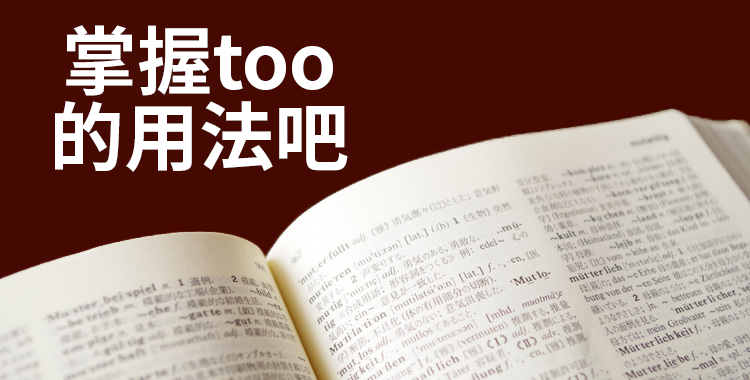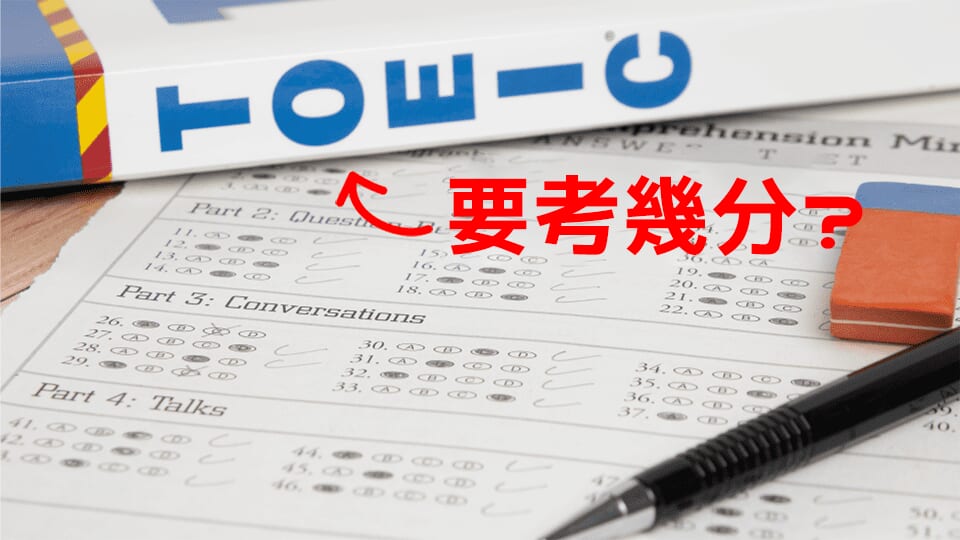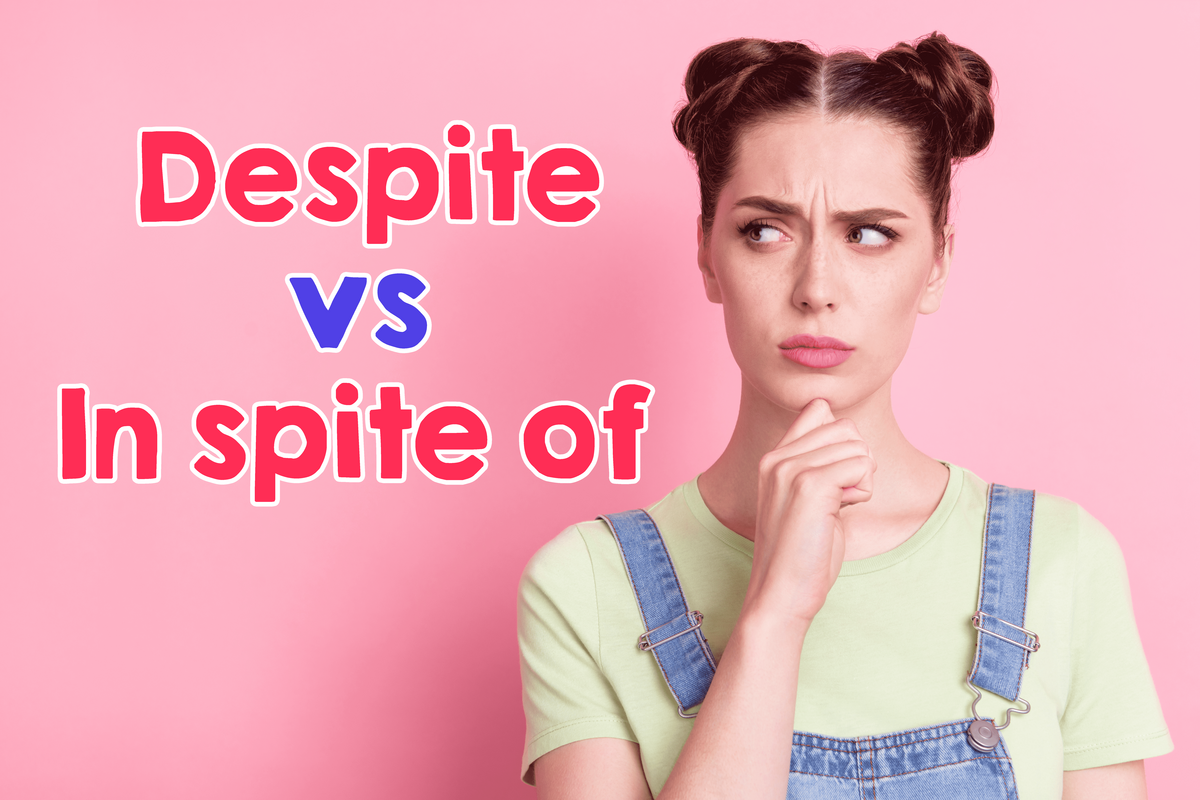大家好,我是NativeCamp的Poohish老師。
各位在學到”too”這個英文單字的時候,是否有個疑問是,為什麼”too”在短語跟句子中會因為位置的不同產生不同的意思呢?
不可思議的是”too”這個單字真的會因為文脈跟放置的位置不同而產生不同的意思。
因此,這次我們要來好好整理”too”的意思,試著為各位總結它的意思跟使用方法。
先從Me too跟you too的意思還有強調詞語的too來做解說。
如果剛好有對”too”不太熟的朋友,可以參考看看這篇文章喔!
目次
Too的意思是「還有」、「~也」
只要提到”too”這個字不管是誰都會馬上想到「~也」、「還有」的意思吧?這裡的too詞性是副詞。
要說到最簡單的用法”me too”是大家最耳熟能詳的表現對吧? 當想要附和對方的時候會用到這個句子。
還有,當你被對方回應”Nice to meet you.”的時候,我們會回答”Nice to meet you,too.”這個時候的too也是「~也」的意思。
翻成中文的話大概就是「我也是如此」的感覺。
當使用”too”來表示「~也」、「還有」的意思時,會放在句尾或是放在同樣是表達「~也」、「還有」意思的單字後面。
即使用文字說明也不一定有辦法讓各位抓到要領,就讓我們實際來看例句學習要怎麼使用吧!
1)「我也」的意思
Me too是「我也」、「我也是這樣」的意思,我們來看一下例句是如何使用的吧?
A: I like pizza.
(我喜歡披薩。)
B: Me too !
(我也是!)
A: And I sometime cook pizza at home.
(我有時候也會在家自己做披薩。)
B: So do I !
(我也會!)
2) ”You”的意思
接下來是You too的使用方式。You too可以是一些句子的縮寫型。
A: Have a good day !
(祝你有美好的一天。)
B: Thanks. You too.
(謝謝,你也是。)
C: It was nice talking to you.
(很高興能跟你說話。)
D: You too.
(我也是。)
應該很多人會想說,這個句子的後面不是要接”Me too”嗎?
其實這是因為”You too”這個回答是“It was nice talking to you too.”的簡化,對第一次見面打招呼Nice to meet you.的時候,也可以回答“You too”。
只是”You too”是簡化後的說法,通常會給人比較輕鬆、隨意的感覺,所以在正式的場合最好不要簡化。
3)連接句尾的”too”
大家可能很熟悉用在句尾的too,它用來表達「~也」的意思。
A: His sister is very pretty !
(他的姊姊/妹妹非常可愛!)
B: Not only that, she’s quite smart, too.
(不只是這樣,她還很聰明呢。)
C: I think he came here yesterday, too.
(我認為他昨天也來過這裡。)
D: He came here a day before yesterday, too. Seems like he loves this place.
(他前天也有來喔。他似乎很喜歡這裡。)
C: Do you like here, too?
(你也喜歡這裡嗎?)
D: Yes, I fell in love with this place, too.
(恩,我也被這裡給吸引了。)
這裡的用法是大家一開始學習英文時就學到的用法,各位應該很清楚吧?
像是Does she play criket too?一樣,在疑問句裡加上”too”也沒關係,但否定句的時候不能使用”too”。
否定句如果要使用跟”too”同樣意思的詞時,”too”的部分要改成用”neither”或”either”這兩個單字。
強調詞語的”too”
“too”通常是作為「~也」、「還有」意思的單字被大家記得,通常被頻繁用於強調某個詞語。
如果是有一定程度的英語對話,也許用”too”的人會變得相當多。
使用具有強調意思的”too”時,會把”too”放在想要強調的對象前。
這裡”too”的用法不單純只是像”very”一樣用來強調,而是「有一點太超過了」的意思。
舉例來說在積極的詞語前加上too也不會讓句子本身變成積極的意思。
我們來看以下的英語例句,學習如何掌握這個用法吧。
1)肯定句中用來強調的”too”
A: I ate too much.
(我吃太多了。)
B: I know. It was too delicious so we couldn’t stop eating.
(我知道,因為太好吃了所以停不下來。)
C: Vocabulary of the English language is too large. I can’t remember all of it.
(英文的單字實在太多了,我沒辦法全部記下來。)
D: Don’t worry. We don’t have to remember all the vocabularies.
(別擔心,我們沒必要記下所有的單字。)
E: Why didn’t you go out with Maria? She likes you !
(為什麼不跟瑪麗亞出去呢?她喜歡你耶!)
F: Well, she’s just too beautiful for me. I can’t relax when I am with her.
(恩……她實在太漂亮了,我跟她在一起時沒辦法好好放鬆。
G: Sorry, I’m late.
(對不起,我遲到了。)
H: You are not only just “late”, but too late! The movie has already started.
(你不是稍微遲到,而是遲到太久了!電影都已經開始了!)
I: My girlfriend cheated on me again.
(你的女朋友又劈腿了?)
J: You are too nice. Why don’t you dump her ?
(你人太好了,幹嘛不甩掉她?)
You are too late.除了表示對方遲到太久,還可以把自己的怒氣強烈地傳達給對方。
還有You are too nice.是較為委婉的用法,通常用來表達為什麼不去譴責對方的意思。
2)否定句中用來強調的”too”
A: How are you doing?
(你最近還好嗎?)
B: Not too bad.
(還過得去。)
C: Don’t drink too much !
(別喝太多!)
D: I know. I shouldn’t drink too much today. My girl is waiting for me.
(我知道,今天別喝太多比較好,我女朋友還在等我。)
C: Right. She won’t be too happy if you come home very late.
(好,如果太晚回去,你女朋友會不開心的。)
※較為溫柔的表達方式,意旨「女朋友會生氣」。
E: Why don’t we hang out this evening?
(今晚我們要不要出去玩?)
F: I’m not too keen on going out in the evening.
(我不太喜歡晚上出門。)
E: Why?
(為什麼?)
F: I’m just not too crazy about partying.
(只是不太喜歡去參加派對。)
用來強調的too像這樣用在否定句中,就會是「不太~」的意思。
由於是「太過~」的否定型,不管怎樣都可以猜測出意思。
順帶一提「不太~」的表現跟中文裡的委婉、溫柔表現的效果一樣。
在不方便說“I don’t want to.”的情況下可以改用“I’m not too keen on.”這樣的表現。
“too”的六個同義詞表現
從剛剛學到的部份我們可以知道”too”不只「~也」,也有「太過頭」的意思。
如果掌握了“too”的用法的話,可以試著替換其他單字進去。
這裡跟大家介紹六個與”too”相同意思的表現。
如果能記得其他同義詞的表現並加以區分的話,各位的英語能力會變得很厲害喔!
Likewise
I didn’t bring my dictionary today, I needed it in the class though.
—Likewise. (Me too.)
(我今天沒有帶字典。)
(我也是。)
這個時候的”likewise”跟”me too”是同個意思。但跟”me too”相比較為正式的說法。
在對學校老師或上司時可以使用。
・He planted trees in his garden, and his friends did likewise.
(He planted trees in his garden, and his friends did too.)
(他在庭院種樹,他的朋友們也是。)
這裡的”likewise”跟句尾連接的”too”一樣都是「~也」的意思。
As well
・He sold his car as well.
(He sold his car too.)
(他把他的車子賣了。)
“as well”如果放在句尾也會變成「~也」的意思。這裡要注意的是只有肯定句才能使用。
・Will you travel abroad this year as well?
(Will you travel abroad this year too?)
(今年也要出國旅行嗎?)
Also
・I’m thirsty, and I’m also hungry. Why don’t we go to the café?
(I’m thirsty, and I’m hungry too. Why don’t we go to the café?)
(我口渴了,肚子也好餓。要去咖啡廳嗎?)
“also”跟上面一樣也是「~也」的意思,它會根據動詞種類的不同改變放置的位置。
使用Be動詞的時候”also”會緊接在be動詞後面。
使用其他動詞的場合會接在主語的後面,各位要好好記得不要搞錯了喔!
・He also had a question for an American tutor, but he was too shy to ask.
(He had a question for an American tutor too, but he was too shy to ask.)
(他也對美國人講師有問題想問,但他太害羞不敢去問。)
Beyond
・My sister was beyond excited to see my fiancée.
(My sister was too excited to see my fiancée.)
(明明我的妹妹第一次跟我的婚約者見面,但是卻很興奮。)
“beyond”是通常是作為「朝~方向」的意思使用,但太過頭的場合也會作為「太過~」的意思使用。
平常都是作為說明場所時使用,像是「朝著河川的方向」、「朝著這條路的方向」之類的,如果記得其他用法的話是相當方便的。
如果在考試的時候突然出題的話就很派得上用場了。
・I feel beyond nervous, and my heart is beating very fast.
(I feel too nervous, and my heart is beating very fast.)
(我太緊張了,心臟不停的碰碰跳呢。)
Extraordinarily
・It’s extraordinarily expensive for me to travel to America, so I am going to save money for it.
(It’s too expensive for me to travel to America, so I am going to save money for it.)
(因為太貴了所以沒辦法去美國旅行,只好來存錢了。)
“extraordinarily”通常是「異常的」、「非常地」的意思,也可以用來替換成「太過~」的意思。
・She is extraordinarily beautiful. I don’t want to take a picture with her because I look ugly.
(She is too beautiful. I don’t want to take a picture with her because I look ugly. )
(她太漂亮了所以我不想跟她一起拍照,因為這樣會顯得我很醜。)
“too”的四個成語
有使用到”too”的成語有很多,在此選出四個來介紹。
在日常生活中多使用的話,各位的英語對話能力會更上一層樓喔!
I know only too well.
直譯過來的意思是「知道~太多了」,進而衍生出「有十足的把握」的意思。中文裡的十足並不是真的指十隻腳,而是形容有很多、充足的意思。
Too many chiefs and not enough Indians.
直譯的意思就是太多領導卻沒有足夠的印地安人。如果領導者太多,但實際去實行的人卻很少的話事情是沒辦法成功的。因此這句話衍生成事物沒有辦法好好進展的意思。
人數眾多的時候一定要將工作分類,決定好要由誰來準備、誰來實行。
You can’t be too careful.
這是告訴你小心謹慎不是壞事的意思。各位是否有過出門時檢查門窗跟有沒有忘記東西,結果最後因為太謹慎而導致遲到被朋友責備的經驗呢?
比起小心謹慎導致沒有辦法守時,因為粗心導致大禍臨頭要更來的糟糕吧。
這種時候可以使用這句。
It is never too late to learn.
學習不嫌晚、學習無關年紀的意思。
在開始接觸新東西時,是否有因為「是不是這個年紀已經不行了?」這樣的想法而放棄去學習呢?
當你產生了想要開始的念頭,就是對你來說最好的出發點。英語也是如此。
通常英語聽力跟發音給人的印象是要從小學習跟訓練,否則就來不及的印象,只要有「想要學習」的心情,不管是怎樣的程度都可以變得很厲害。
掌握英語too的使用
這次介紹到的兩種不同的”too”使用形式,是否有好好理解了?
特別是強調用的”too”,只要習慣在英語會話時使用的話,就會是相當便利的表現喔!好好地掌握用法吧!
最後感謝各位讀到最後。



















